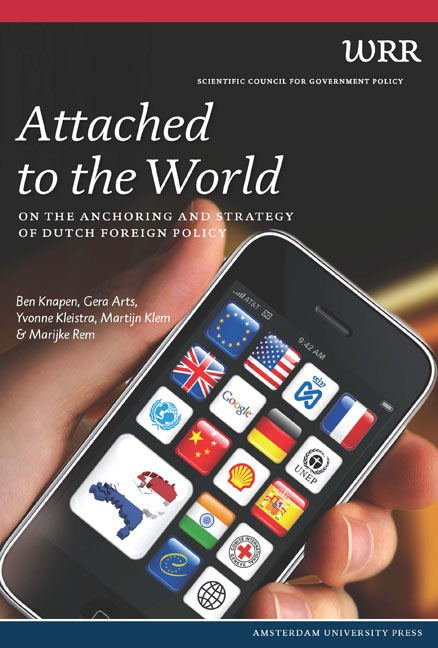Book contents
- Frontmatter
- Contents
- Summary
- Preface
- 1 Motivation and Background: An Introduction
- 2 From Fragmentation to Strategy
- 3 Europe: Arena and Link
- 4 Directing and Facilitating
- 5 Conclusions and Recommendations
- List of Abbreviations
- References
- List of Interviewees
- Appendix 1 The Interrelatedness of the Dutch EconomY
- Appendix 2 The Interrelatedness of the Netherlands With other Nations
- Appendix 3 The Dutch Network of Embassies in a Comparative Perspective
- Appendix 4 Sovereignty in Eu Member States: A Comparison
5 - Conclusions and Recommendations
Published online by Cambridge University Press: 19 January 2021
- Frontmatter
- Contents
- Summary
- Preface
- 1 Motivation and Background: An Introduction
- 2 From Fragmentation to Strategy
- 3 Europe: Arena and Link
- 4 Directing and Facilitating
- 5 Conclusions and Recommendations
- List of Abbreviations
- References
- List of Interviewees
- Appendix 1 The Interrelatedness of the Dutch EconomY
- Appendix 2 The Interrelatedness of the Netherlands With other Nations
- Appendix 3 The Dutch Network of Embassies in a Comparative Perspective
- Appendix 4 Sovereignty in Eu Member States: A Comparison
Summary
In the introduction to this report, we asked the question of how the Netherlands can develop a foreign policy considering the radically changing circumstances and conditions in which such a policy is now to be pursued. This is not a purely academic exercise. Society is suspicious about everything that is coming our way from other nations and the temptation to retreat behind Holland's dikes is great. However, our international orientation is and remains a crucial source of prosperity and well-being. At the same time, the new international environment requires a new repertoire to sustain the relevance, credibility and conviction of this orientation. The marketplace of international relations is overcrowded now, with many new visitors and other market superintendents. To find a niche here with a ‘product’ that would be endorsed by many of those involved, is quite a challenge.
In order to rise to this challenge, it is essential to convince ourselves of how much the circumstances have changed. Only then can we draw conclusions that go beyond minor adaptations here or another call for coordination efforts there. In this report, we have explored the possible consequences from three different perspectives: the nature and scope of foreign policy; the platform where the Netherlands can pursue its foreign policy; and the way in which policies are implemented. This has led to the findings and recommendations below.
THE NETHERLANDS IN A CHANGING WORLD
The analyses that underlie this report show that the character of international relations, the balance of power and the players have changed to the degree that we now, in fact, have a new, hybrid context in which foreign policy is to be pursued.
On the one hand, there is the world of geopolitics and the nation state. This is the context of power relations. The rise of Asia – China in particular – attracts widespread attention and yet, the speed of this development seems to have taken everyone by surprise. In the last WRR report on Dutch foreign policy, Stability and Security in Europe (1995), countries like China and India did not even deserve a mention. The acronym BRIC is now widely accepted, but it remains hard to imagine a world whose dynamic centre is no longer – let alone exclusively – located in the West.
- Type
- Chapter
- Information
- Attached to the WorldOn the Anchoring and Strategy of Dutch Foreign Policy, pp. 107 - 118Publisher: Amsterdam University PressPrint publication year: 2012

